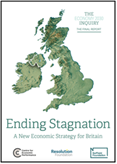
August's Market Insights
19 Aug, 20244 minsWelcome to the August edition of Meridian Insights. The new Labour Government is now in plac...

Welcome to the August edition of Meridian Insights. The new Labour Government is now in place. It is a long time since every government minister was ‘new to role’! There is certainly an air of political change, and we are starting to see some of the detail being released. We are following all the government announcements closely and we’ll make sure that you are kept up to date.
Labour Market Overview

The latest ONS Labour Market Overview shows that:
- UK unemployment rate decreased to 4.2%, 1.435 million people unemployed.
- Unemployment amongst young people decreased but remains high, particularly the youngest age group (aged 16-17 = 24.5% / aged 18-24 = 12%)
- Employment rate increased slightly to 74.5%, 33.09 million people employed.
- UK economic inactivity rate was largely unchanged on the last quarter at 22.2% … and higher than 12 months ago.
- 9.410 million people are economically inactive, an increase of 350,000 on last year and 859,000 higher than pre-pandemic levels.
- Vacancies fell again to 884,000, the 25th period fall, down 26,000 from previous quarter, but higher than pre-Covid levels. This means there were 1.6 unemployed people per vacancy in April to June 2024, similar to the previous quarter.
- Payrolled employees for July 2024 were 30.4 million, a rise of 0.8% compared to last year. This is a rise of 252,000 over the last 12 months. 1.5 million higher than pre-pandemic levels.
- Annual growth in regular pay without bonus increased by 5.4%, and with bonus by 4.5%, this was the lowest growth since 2022. Adjusted for inflation, annual growth regular pay was 2.4% and total pay was 1.6%.
- Claimant count increased by 162,255 on the month and 256,680 on the year to 1.801 million. This is the measure of those receiving benefit principally due to being unemployed.
- Redundancies increased to 3.8 per thousand employees, still slightly lower than last year.
- 100,000 working days were lost because of labour disputes in June, up from 51,000 in the previous month.
An insight into what might lay ahead?

The Department for the Economy in Northern Ireland opened its consultation on the ‘Good Jobs’ Employment Bill in July and it closes on 30th September 2024. The consultation covers:
- Replacing zero hours contracts with contracts that provide flexibility and protect workers rights
- Understanding employment status and bogus self-employment
- Employment rights: Dismissal and re-engagement (Fire and Re-hire)
Changes to NMW

The government has announced that they are changing the way that the National Minimum Wage is set. For the first time, the Low Pay Commission (LPC) will factor in the cost of living when deciding the rate of the Minimum Wage and Living Wage.
They are also taking the first steps towards making rates the same for all adults by narrowing the gap between the National Minimum Wage, for 18–20-year-olds, and the National Living Wage. In addition to the cost of living, the remit of the LPC will continue to consider the impact on business, competitiveness, the labour market and the wider economy.
CIPD Market Outlook

The CIPD published its latest Labour Market Outlook Summer 2024. Key findings:
- Net employment balance falls slightly (the difference between employers expecting to increase staff levels in the next three months and those expecting to decrease)
- Public sector employment confidence below zero
- Over one fifth of the public sector plan to shrink staff
- Hard to fill vacancies remain prevalent
- Median expected pay drops to 3%
The Hidden Cost of Sickness

The Institute for Public Policy Research latest report found that the hidden cost of sickness absence increased to £103bn in 2023, an increase of £30bn since 2018. Most of this increase is due to lower productivity with only £5bn due to a rise in sick days. Employees now lose the equivalent of 44 days productivity on average due to working through sickness, up from 35 days in 2018, and lose a further 6.7 days taking sick leave, up from 3.7 days in 2018.
TUC – BME
The Trade Union Congress (TUC) published new analysis that shows that the number of BME (Black and minority ethnic) people in insecure work has reached a record high of 878,800. The analysis shows that the overall number of people in insecure or precarious employment – like zero-hours-contracts, low-paid self-employment and casual/seasonal work – increased by nearly one million between 2011 and 2023 to 4.1 million, with BME workers bearing the brunt of this increase.
The Resolution Foundation – Ending Stagnation

The Resolution Foundation published The Economy 2030 – The Final report and found that “the UK has great strengths, but is a decade and a half into a period of stagnation. The toxic combination of slow growth and high inequality was straining the living standards of low- and middle-income Britain well before the cost-of-living crisis struck. It is time to embark on a new path”. They identified 10 key facts including ‘Bad Work’ - half of shift workers in Britain receive less than a week’s notice of their working hours or schedules.
Financial Pressures Survey

LCP, a financial and investment consultancy, have published a survey which reveals that 1 in 4 Brits are thinking about taking a second job as financial pressure continue to bite. Key findings:
- 56% of employees have experienced financial difficulty
- 43% said they spent part of their working day addressing personal issues
- 37% said they took time off for personal reasons
- 48% considering change their job to earn more money
UK Immigration Policy

The Home Office has announced that from 6th August 2024, any person with a biometric residence permit (BRP) expiring on 31 December 2024 can now create a UKVI account and access their eVisa, without needing an invitation from UKVI to do so. See the Online Immigration Status (eVisa) for more information.
The Home Office has also launched a series of engagement events for businesses to hear how the UK Government is continuing to transition to eVisa and what action they need to take to create a UKVI account to access their eVisa. The ALP is attending one of these events to provide further information to members.
Migration

The Home Secretary addressed Parliament setting out a different approach to migration – “one that links migration policy and visa controls to skills and labour market policies – so immigration is not used as an alternative to training or tackling workforce problems here at home.” Key points:
- Migration Advisory Committee (MAC) commissioned to review the reliance of key sectors on international recruitment
- MAC to be strengthened including deploying additional Home Office staff to support their work
- No changes to the minimum income required until the MAC has completed its review














